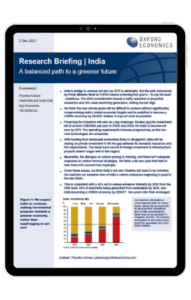A balanced path to a greener future for India

India’s pledge to achieve net zero by 2070 is admirable. But the path announced by Prime Minister Modi at COP26 toward achieving that goal is – to say the least – ambitious. The 2030 commitments include a hefty reduction in projected emissions and 50% clean electricity generation, setting the bar high.
What you will learn from this report:
- We think the new climate goals will be difficult to achieve without significantly compromising India’s stated economic targets and its ambition to become a US$5tn economy by 2024/25. Indeed, it may not even be possible.
- Financing the transition will also be a big challenge. Studies peg the investment bill at around US$200bn per year in 2020s and 2030s for India to become net zero by 2070. The spending requirements increase progressively as the low-cost technologies are exhausted.
- With funding from developed economies likely to disappoint, India will be relying on private investment to fill the gap between its domestic resources and the requirements. The bleak track record of foreign investment in infrastructure projects doesn’t augur well in this regard.
Tags:
Related Services

Post
Airbnb’s Economic Contribution to APAC in 2024: GDP, Jobs, and Regional Impact
Airbnb's platform connects hosts across Asia Pacific (APAC) with travellers from around the world. Oxford Economics was commissioned by Airbnb to quantify its economic footprint in 10 APAC markets in 2024.
Find Out More
Post
New Rules of Engagement: The Strategic Rise of Government Affairs in Asia
What’s behind Asia’s new era of policy assertiveness? What does it mean for international firms?
Find Out More